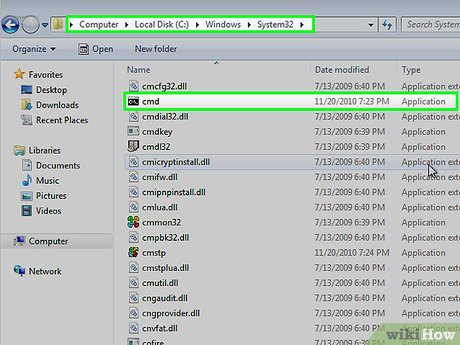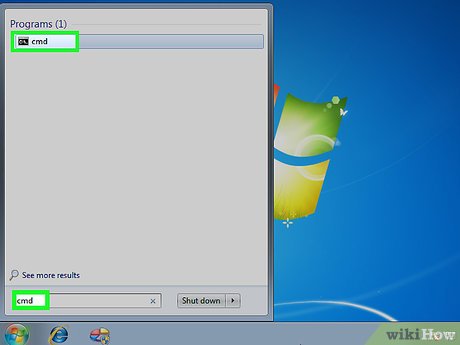How to Find All Commands of CMD in Your Computer
Part 1 of 2:
List of the Most Basic and Frequently Used Commands Accessed Within the Interpreter
-
 Please Note; TAKEOWN, NETSH and many other more 'intrusive' commands WILL NOT be present here.
Please Note; TAKEOWN, NETSH and many other more 'intrusive' commands WILL NOT be present here.- See more commands (but NOT ALL of them) you can visit microsoft technet - https://technet.microsoft.com/en-au/library/bb490890.aspx
-
 Find what's actually available in your interpreter, as well what programs are using it, check the cmd folder. Go to computer --->C:--->windows--->System32. The Application (not application extension) are the current executable commands within the interpreter on your system.
Find what's actually available in your interpreter, as well what programs are using it, check the cmd folder. Go to computer --->C:--->windows--->System32. The Application (not application extension) are the current executable commands within the interpreter on your system. -
 If you are at the Command Prompt, type the application name and the /? attribute (read further) or type the word /help after the command and to see what it does, and the basic way to use it
If you are at the Command Prompt, type the application name and the /? attribute (read further) or type the word /help after the command and to see what it does, and the basic way to use it -
 Open the Command Prompt. You can open the Command Prompt by pressing ⊞ Win+R to open the Run box and typing cmd. Windows 8 users can also press ⊞ Win+X and select Command Prompt from the menu.
Open the Command Prompt. You can open the Command Prompt by pressing ⊞ Win+R to open the Run box and typing cmd. Windows 8 users can also press ⊞ Win+X and select Command Prompt from the menu. -
 Retrieve the list of commands. Type help and press ↵ Enter. A list of all the available commands will be displayed. The listed is sorted alphabetically.
Retrieve the list of commands. Type help and press ↵ Enter. A list of all the available commands will be displayed. The listed is sorted alphabetically.- The list is usually larger than the Command Prompt window, so you may need to scroll up to find the command you want.
- The list varies slightly depending on which Windows version you are using, as commands are occasionally added or removed.
- A short description of the command will be displayed next to each entry.
- You can enter the help command at any location in the Command Prompt.
Part 2 of 2:
Getting Help With a Specific Command
-
 Open the Command Prompt. You can open the Command Prompt by pressing ⊞ Win+R to open the Run box and typing cmd. Windows 8 users can also press ⊞ Win+X and select Command Prompt from the menu.
Open the Command Prompt. You can open the Command Prompt by pressing ⊞ Win+R to open the Run box and typing cmd. Windows 8 users can also press ⊞ Win+X and select Command Prompt from the menu. -
 Type help, followed by the command. For example, if you wanted more information n the "mkdir" command, you would type help mkdir and press ↵ Enter. The additional information will be displayed beneath.
Type help, followed by the command. For example, if you wanted more information n the "mkdir" command, you would type help mkdir and press ↵ Enter. The additional information will be displayed beneath. -
 Review the information that appears. The amount of information you get will vary depending on the command and its complexity. The help information may just tell you how to properly format the command, or it may provide information on how to get more functionality out of it than you might normally.[1]
Review the information that appears. The amount of information you get will vary depending on the command and its complexity. The help information may just tell you how to properly format the command, or it may provide information on how to get more functionality out of it than you might normally.[1]
Share by
Micah Soto
Update 04 March 2020







